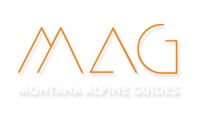FOOTWEAR – Gannett Peak
- Lightweight mountaineering boot that should accommodate a semi-automatic crampon. Pick something similar to Guides Choice: Scarpa’s Zodiac Tech GTX
- light weight camp shoe that can double as a river crossing shoe, not a sandal. (Crocs or a mesh fabric shoe is ideal)
- Socks – 2 to 4 pairs (synthetic or wool-mix). Sized for your boots. Thin liners recommended for blister management.
NOTE: Some participants choose to have hiking approach shoe for the majority of the hiking and only use the climbing boot on the day of our climb. This can be a good combination but obviously adds weight to your load.
For all overnight trips
FOOTWEAR – Objective dependent
- Light Weight Mountaineering Boots
- Trips before mid-July and those including extensive snow climbing (Granite or Gannett) require a lightweight mountaineering boot NOT a plastic boot. Make sure you spend some time in them prior to your trip (i.e. long hikes)
- Approach Shoes – Sticky rubber hiking shoe for non-technical climbing.
- Rock Shoes – For technical rock climbing routes. (sticky rubber approach shoes are fine for moderate routes; i.e. Granite Peak)
- Socks – 2 to 4 pairs (synthetic or wool-mix). Sized for your boots. Thin liners recommended for blister management
TOP LAYERS
- T-shirt/sport shirt – synthetic
- Long sleeve base layer – synthetic or wool
- Fleece – medium weight polar fleece
- Puffy jacket (down or synthetic fill) – light to medium weight
- Rain Jacket (lightweight)
BOTTOM LAYERS
- Bottom base layer (long johns) – synthetic or wool
- Climbing Pant – synthetic/nylon
- Hiking Short – synthetic
- Rain Pant – lightweight
OTHER
- Gaiters through mid July
- Hat or visor for sun
- Hat: lightweight to wear under a helmet
- Gloves (Gore-tex shell, fleece liner)
- Backpack – 65-75L
- Summit Pack – 15-25L super light weight
- Sleeping Bag – 15 degree
- Sleeping Pad – Closed-cell foam or Thermarest
- Tent (optional): We will supply tents but they are 4 season and made to last. If you have a lightweight tent you may want to consider bringing it along.
- Water Bottles – two to three 1L bottles or hydration system and at least 1 bottle
- Sun Glasses with eyeglass retention strap
- Sunscreen and lip balm
- Insect Repellent
- Headlamp with extra batteries
- Personal care items – toothbrush, etc. keep it minimal
- Restroom – toilet paper (PACK IT OUT!) Bring 3 zip lock bags; one for clean paper, two for used TP. This land is pristine; we have to leave it that way. Thanks
- First aid – blister care, personal meds (inform your guide or our office if bringing meds)
- Misc. items – light knife, camera, bandana, hand sanitizer, washcloth, etc.
- Bowl, spoon, and insulated mug
- Water treatment – tablets or filter
- Bear Spray
- Trekking Poles
- Mosquito head net
FOOD
- Snacks/Lunches for each day – a mix of sweet and savory items. In the end you have to like it to eat, so bring what you like, but think about weight vs. caloric value.
- Drink mixes – optional but if it helps you hydrate; bring it.
- Guides choices – A small sandwich and or piece of fruit for day 1 can be nice. Nuts, dried fruit, snack bars. A few energy gel/GU packs for that needed boost at the end of our long days (they can really help!)
OPTIONAL ITEMS
- Camp shoe – light weight, closed toe (Crocs work great)
- Reading material (Lightweight)
- Music (guitars and drum sets not suggested)
COLD WEATHER CONSIDERATIONS
Early and late season trips (June and late August-Sept) require warmer clothing.
- Heavy Down or insulated jacket
- Lightweight fleece pants
- Lightweight balaclava or neck gaiter
WE WILL SUPPLY
- Climbing gear. Please coordinate with us for pre-trip gear checks and to be issued harnesses, helmets, crampons, and ice axes. You are welcomed to bring your own equipment.
- Cookware – Stoves, cook sets, fuel
- Tents – They are built to last so you may want to consider your own tent if you want to save on weight or look in to a porter.
NOTE: A POUND IN YOUR PACK IS A POUND ON YOUR BACK!
Attempt to shed every pound that you can. The lighter your load the more you will be able to enjoy yourself. On top of all the gear on this list you will be expected to carry your personal climbing gear, your share of the group food and cookware, tent, and water bottles (full). Pack weight estimates are between 45-65 lbs, depending on trip length and objectives.
***PORTERS ARE HIGHLY RECOMMENDED*** Please call or email for details.
